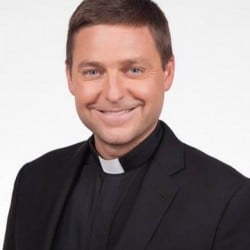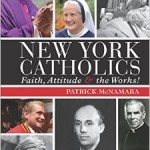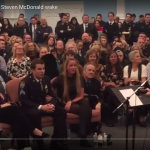 Christopher contributor Father Jonathan Morris spent last week in Rome while the Extraordinary Synod for the Family took place. Now that it’s over, he took some time to answer a few questions via an email interview:
Christopher contributor Father Jonathan Morris spent last week in Rome while the Extraordinary Synod for the Family took place. Now that it’s over, he took some time to answer a few questions via an email interview:
TR: In brief layman’s terms, what is the purpose of having a synod on the family?
Father Jonathan: The history of “Synods” can be traced back to Pope Paul VI, whom Pope Francis just beatified in Rome. It comes from the Greek, meaning “journeying together.” Think, for example, of our English word, “synergy.” The Pope gathers with representatives from around the world to journey together toward a common goal. It is a meeting called by the pope. It consists of bishops, lay experts, and representatives of other faiths to dialogue about a particular topic. This time Pope Francis wanted a dialogue about how the Church can minister better to families. I think Pope Francis was particularly interested in discussing how the Church can help people who feel that they can no longer be fully part of our Church because of their own choices or the choices of others’.
TR: If the teachings of the Church are immutable, what changes can the synod bring about?
Father Jonathan: Well, not all of the Church’s “teachings” are unchangeable. A brief look at our history as a Church is enough to see how many Church practices have changed. But, you are right, not even the pope can change what the Bible says, or what the Church has always taught on areas of faith and morals. So the synod certainly wasn’t about changing doctrine. That said, I think the Church (including all of us individually) can and should grow in our understanding of the Bible and of God’s will for us in this very complex world we live in. I was so happy to see how Pope Francis was unafraid to revisit how we have approached pastoral challenges in the past – and his willingness to find new, fresh ways of applying Biblical principles. Pope Francis is not the first one to do this. I’m thinking, for example, of how the Church has grown in its understanding of suicide. At one point, the Church didn’t even allow for public, Christian funerals for someone who committed suicide. Thank God, we are beyond that. Our deeper understanding of the psychological sciences has opened our minds to the very real possibility that the tragic act of suicide does not always equal a free and final rejection of God.
TR: How difficult is it for the bishops and cardinals to walk the line between adhering to both the letter of the law and the spirit of the law?
Father Jonathan: Very difficult. I find it difficult even in my own life at a very simple level…For example, how do I “Honor the Lord’s Day?” Is this commandment just about going to mass on Sunday (or in my case, celebrating mass) or should it be a true day of rest and prayer that makes it different from all other days. In this synod the members were trying to find ways of bringing the light of Jesus to some of the most difficult areas of family relationships. How do we help, for example, a young woman in her twenties who was divorced after six months of marriage due to no fault of her own? How do we help her stay close to the Church if she can’t get an annulment and still wants to date and re-marry? These are not easy issues.
TR: After the relatio – the midway document – was released there was a lot of excitement: liberals loved it, conservatives hated it. What should both sides keep in mind when reading this document – or any document that comes out of this extraordinary synod?
Father Jonathan: In my opinion, the Synod organizers made a big mistake in releasing the “relatio” half way through the Synod, even if this was part of the agreed upon process used in previous synod meetings. The “relatio” can’t be considered an official Vatican “document” in any sense of the word, but this is how the media understood it. And understandably so. It was on the Vatican website. The “relatio” is actually a brief summary of the main points made by the synod members up to that point in the meetings. It was supposed to serve as a base upon which the Synod could prepare their final message. But the world doesn’t work like that. If the Vatican posts something on its website, most news outlets and most people will give it the weight of any other Vatican document. I’m sure it was a learning experience for everyone involved.
TR: There’s been a lot of media coverage of the “hot topics” discussed at the synod. But what about other issues? What issue or issues have been given short shrift by the media coverage?
Father Jonathan: Great question. Just think of your own family, or your friends’ families. While we all have challenges at home, the family unit is precious; it is where we first learn to love and be loved. When a husband and wife love each other in the good times and in the bad and together raise children in a loving environment, how beautiful is that! Thankfully, the final message of this synod focused a great deal on the positive elements of family life. I’m sure Pope Francis will underline this when he offers his contribution sometime after the conclusion of the second part of the Synod on the Family in October of 2015.
TR: I interviewed Protestant pastor Matthew Barnett last year and this quote of his stood out for me: “One thing that I love about Jesus is He allows people to belong in order to believe. He didn’t say, ‘When you believe, then we’ll let you belong.’ He allowed people to belong first in order that they may believe. And that’s one of the great things that compassion does. It opens up the door where people begin to understand that we’re gonna love them unconditionally, whether they receive the message of Christ and His compelling love for them, or if they don’t. But it gets hard not to believe when people have loved you so long and been so consistent in your life.” Is there anything in that quote that would apply to the synod process?
Father Jonathan: It’s right on. Just think of the family unit I described above. We come to know and love our family members by living with them, by shared experiences, both good and bad. Thanks to Pope Francis’ message and example of mercy, I as a priest will choose to err on the side of love and compassion every time. This doesn’t mean our message should be one of moral or religious relativism — “anything goes” — but it does invite us to lead with mercy. That means, no matter who walks into my church or into my life, I will try to find a way to connect with them on a personal level and only after that, discern how to lead them, and hopefully be led by them, toward the fullness of God’s truth and love.











